Unit4 Why don't you talk to your parents? 人教版英语八年级下册(复习课件)
文档属性
| 名称 | Unit4 Why don't you talk to your parents? 人教版英语八年级下册(复习课件) |
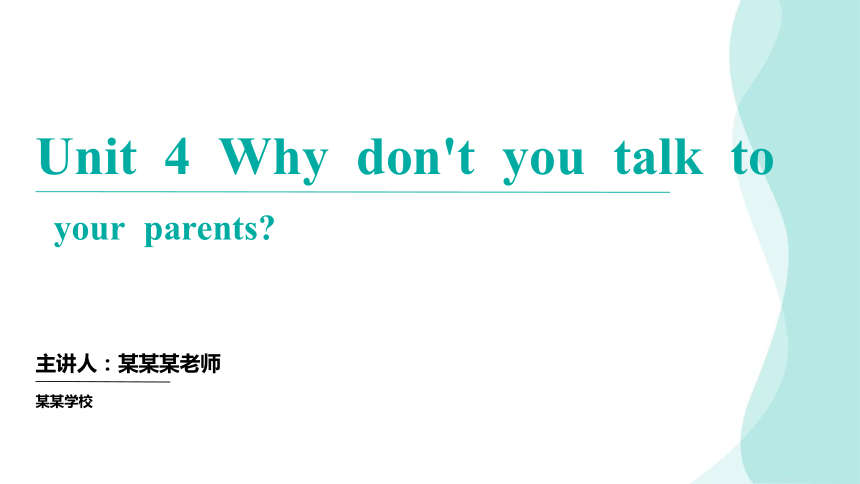
|
|
| 格式 | pptx | ||
| 文件大小 | 571.8KB | ||
| 资源类型 | 试卷 | ||
| 版本资源 | 人教新目标(Go for it)版 | ||
| 科目 | 英语 | ||
| 更新时间 | 2024-04-30 00:00:00 | ||
图片预览

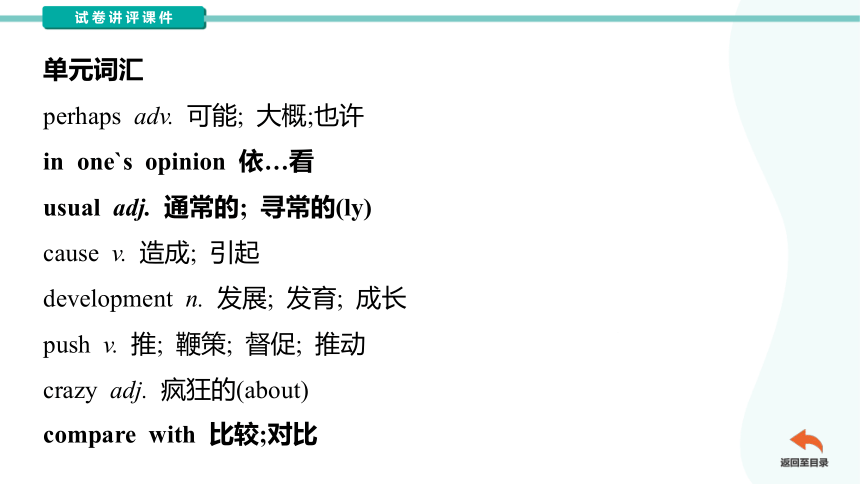
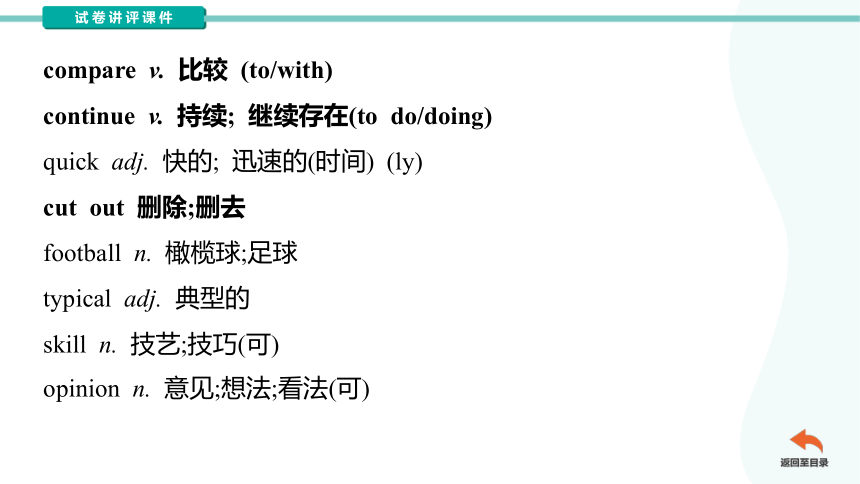
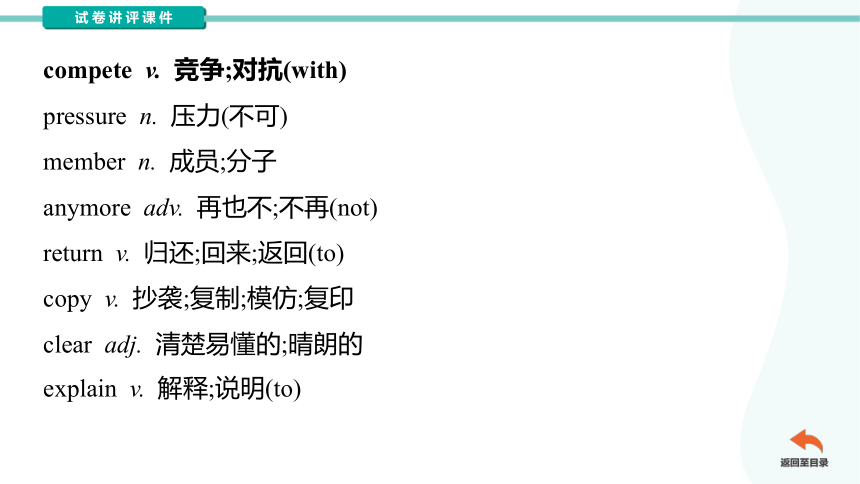
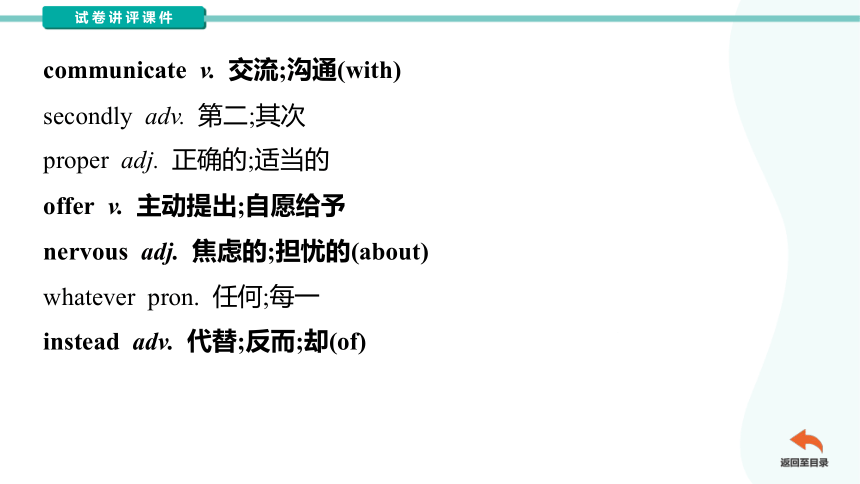
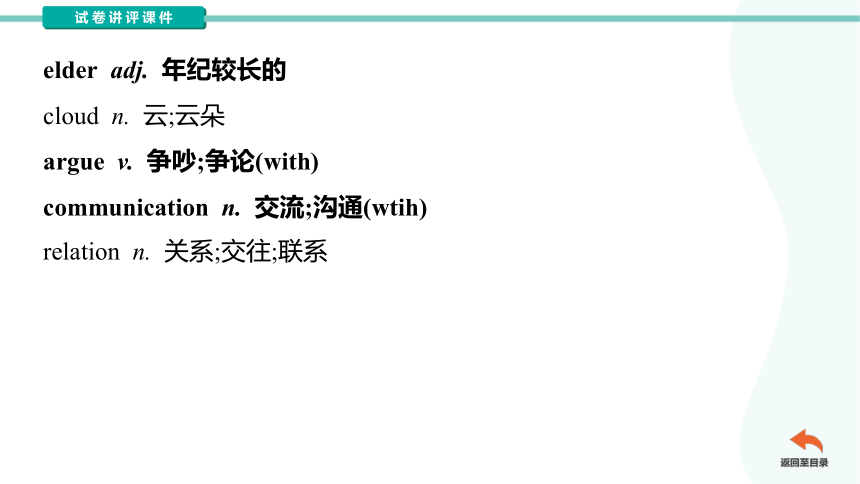
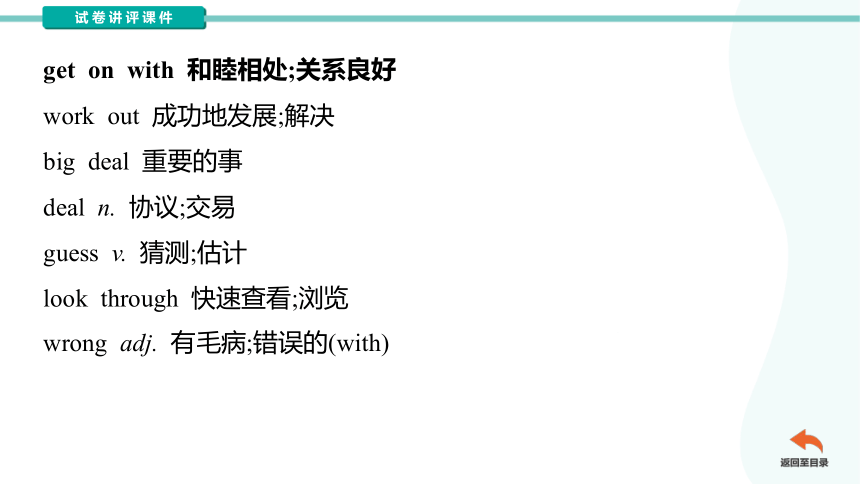
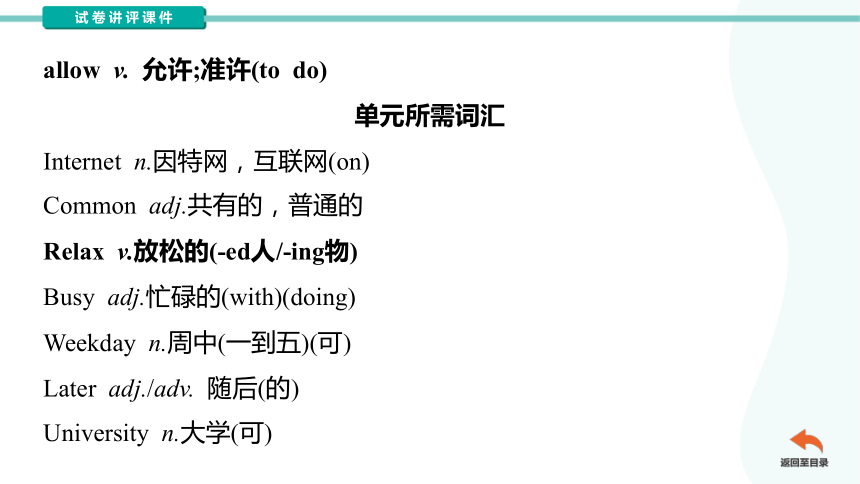
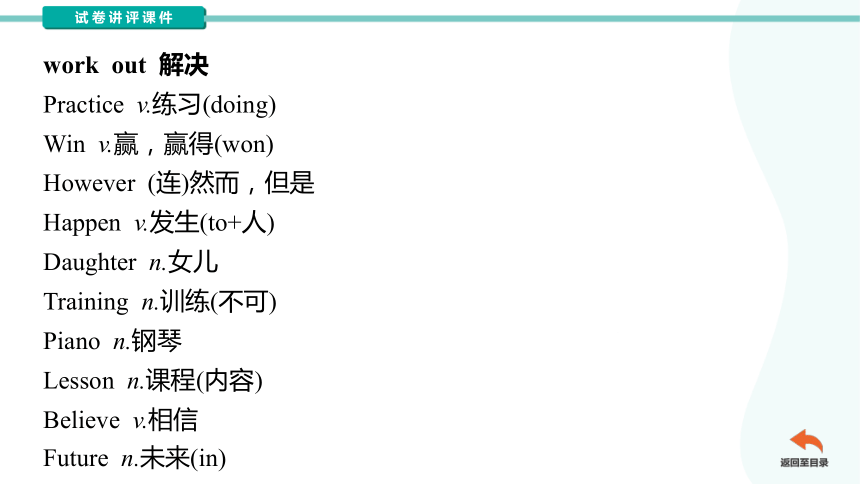
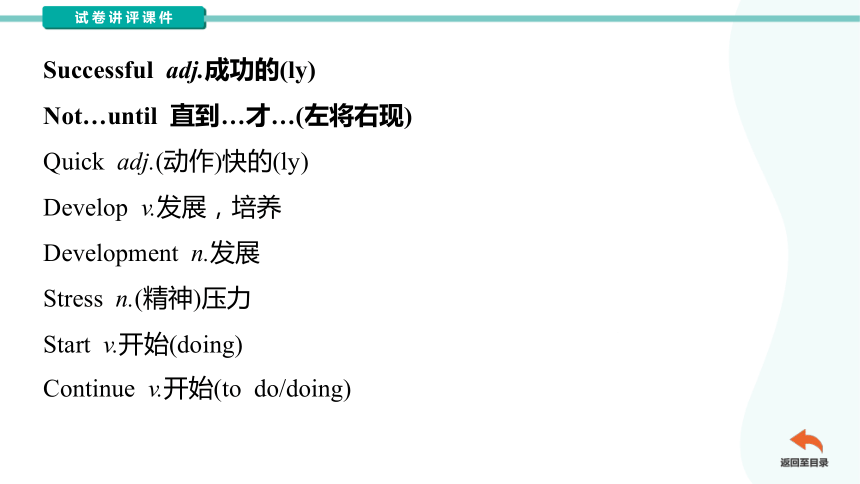
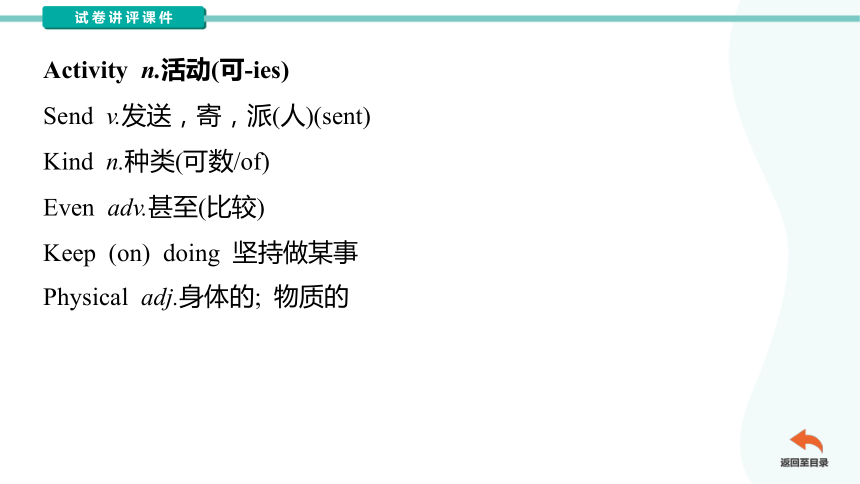
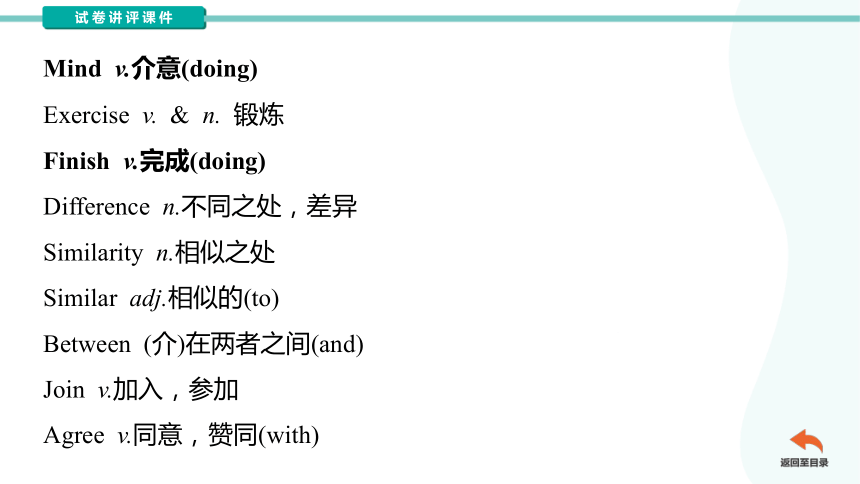
文档简介
(共100张PPT)
Unit 4 Why don't you talk to
your parents
主讲人:某某某老师
某某学校
单元词汇
perhaps adv. 可能; 大概;也许
in one`s opinion 依…看
usual adj. 通常的; 寻常的(ly)
cause v. 造成; 引起
development n. 发展; 发育; 成长
push v. 推; 鞭策; 督促; 推动
crazy adj. 疯狂的(about)
compare with 比较;对比
compare v. 比较 (to/with)
continue v. 持续; 继续存在(to do/doing)
quick adj. 快的; 迅速的(时间) (ly)
cut out 删除;删去
football n. 橄榄球;足球
typical adj. 典型的
skill n. 技艺;技巧(可)
opinion n. 意见;想法;看法(可)
compete v. 竞争;对抗(with)
pressure n. 压力(不可)
member n. 成员;分子
anymore adv. 再也不;不再(not)
return v. 归还;回来;返回(to)
copy v. 抄袭;复制;模仿;复印
clear adj. 清楚易懂的;晴朗的
explain v. 解释;说明(to)
communicate v. 交流;沟通(with)
secondly adv. 第二;其次
proper adj. 正确的;适当的
offer v. 主动提出;自愿给予
nervous adj. 焦虑的;担忧的(about)
whatever pron. 任何;每一
instead adv. 代替;反而;却(of)
elder adj. 年纪较长的
cloud n. 云;云朵
argue v. 争吵;争论(with)
communication n. 交流;沟通(wtih)
relation n. 关系;交往;联系
get on with 和睦相处;关系良好
work out 成功地发展;解决
big deal 重要的事
deal n. 协议;交易
guess v. 猜测;估计
look through 快速查看;浏览
wrong adj. 有毛病;错误的(with)
allow v. 允许;准许(to do)
单元所需词汇
Internet n.因特网,互联网(on)
Common adj.共有的,普通的
Relax v.放松的(-ed人/-ing物)
Busy adj.忙碌的(with)(doing)
Weekday n.周中(一到五)(可)
Later adj./adv. 随后(的)
University n.大学(可)
work out 解决
Practice v.练习(doing)
Win v.赢,赢得(won)
However (连)然而,但是
Happen v.发生(to+人)
Daughter n.女儿
Training n.训练(不可)
Piano n.钢琴
Lesson n.课程(内容)
Believe v.相信
Future n.未来(in)
Successful adj.成功的(ly)
Not…until 直到…才…(左将右现)
Quick adj.(动作)快的(ly)
Develop v.发展,培养
Development n.发展
Stress n.(精神)压力
Start v.开始(doing)
Continue v.开始(to do/doing)
Activity n.活动(可-ies)
Send v.发送,寄,派(人)(sent)
Kind n.种类(可数/of)
Even adv.甚至(比较)
Keep (on) doing 坚持做某事
Physical adj.身体的; 物质的
Mind v.介意(doing)
Exercise v. & n. 锻炼
Finish v.完成(doing)
Difference n.不同之处,差异
Similarity n.相似之处
Similar adj.相似的(to)
Between (介)在两者之间(and)
Join v.加入,参加
Agree v.同意,赞同(with)
Disagree v.反对,不赞同(with)
Think of 认为,想起
Right adj.正确的,对的
Then (连)然后,那么
rest v. & n. 休息
Junk n.垃圾(不可)
Study v.学习,研究
While (连)当…时;同时(前后一致)
Quiet adj.安静的
Turn down 调低声音,拒绝
Not…anymore 不再…
Talk v.聊天,交流(with/to)
Parent n.父母(s)
Too much 太多(不可);(程度)太…
Have to do 不得不做
Hungry adj.饥饿的
Save v.救助,节省
Gift n.礼物(可)
Birthday n.生日
Enough adj.&adv. 足够的(地)(名前形后)
Sleep v.&n.睡觉,睡眠
Free adj.自由的,空闲的,免费的
Thing n.物、事(可)
Hang v. 悬挂(hung)
Hang out 闲逛(俚)
After-school 课后的;课下的
Fight v.打架,对抗(fought)
Get into v.进入,陷入,卷入
Really adv.真地,真正地
Tired adj.劳累的,疲倦的
Until (介)直到
Midnight n. 午夜,半夜(at)
Last (代)上一个(的); 最后一个(的)
Important adj.重要的
Early adj.&adv.早的(地)
Write v.写字,写作,写信(to)(wrote) Letter n.信件,字母(可)
Call up 给…打电话
So that 为了,以便于(句子)
Easy adj.容易的
Wait v.等待(for)
That adv. 那么
Surprise v.使…惊喜/惊讶 n. 惊喜/惊讶
Surprised adj.感到惊喜/惊讶的
Surprising adj.令人惊喜/惊讶的
Be good at 擅长(doing)
Talk bout 讨论,谈论
Matter n.事情,问题
Find v.找到,发现(doing)
Magazine n.杂志(可)
Back v.向后,往回
Still adv.仍然;还
Angry adj.生气的(with)
Forget v.忘记(to do/doing)
Again adv. 再次,又一次
Although/though (连)尽管,虽然(不跟but)
Improve v.提高,提升
Right adj.对的 n.右边(on)
Thank v.&n. 感谢,谢谢(+s/for doing)
Advice v.&n. 建议(to do)(不可)
Problem n. 问题,障碍(doing)
Hope v.&n. 希望(to do/that句子)
Become v.变成,变得(became)
Difficult adj.困难的,艰难的
If (连)如果,是否
Over adj.结束的 (介)在…上方
Always adv.总是,一直
Refuse v.拒绝(to do)
Let v.使,让(do)
Favorite adj.最喜欢的
Grade n.成绩,年级
Shy adj.害羞的
Spend v.花费,度过(on doing)(spent)
Alone adj.&adv. 独自的(地)
Lonely adj.孤独的
Normal adj.正常的(ly)
Age n.年纪(at+of)
词汇精讲
1. allow
allow动词,意为“允许”。用法如下:
1)allow sth.意为“允许某事的发生”。
例:
I can't allow such a thing.
我不允许发生这样的事。
2) allow sb. to do sth.意为“允许某人做某事”。
例:
Her father would not allow her to eat sweets.
她父亲不允许她吃糖果。
They don't allow students to smoke in the classroom.
他们不允许学生在教室抽烟。
2. not… until
Not…until是一个关联词词组,意为“直到…才…”。其中until为
“直到…”,not会与前面的动作或be结合构成“才做/成为…”。而
not…until…这个词组又符合条件句的结构,因此时态上也要遵循主将
从现的原则。_________一般________时间,_______常用__________
时。_________________________________________________
Not部分
为将来
until后
一般现在
(但两件事均发生于过去时间时,主将从现情况消失。)
例:
He won`t go home until his mother comes.
他直到他妈妈过来才回的家。
The test won`t end until the bell rings.
到铃响考试才结束。
She didn`t finish the homework until midnight.
她知道半夜才完成作业。
3. continue
Continue是动词,意为“继续”。后面可以接to do也可以接doing,
但表达含义不同:
1) continue doing指的是继续之前未完成的动作。
例:
After dinner, she continued finishing his math homework.
晚饭后,她继续完成她的数学作业。
I will continue taking class in a hour.
一小时后我会继续上课。
2) continue to do表示之前的工作已经完成,继续做下一个动作。
例:
After math homework, she continues to do her English homework.
(做完)数学作业后,他继续做英语作业。
After this class, she has to continue taking another.
(上完)这节课后,她不得不再继续上另一节课。
4. instead
instead作副词,意为“代替,而不是”,常用在句首或者句尾作状语。
例:
He is tired. Let me go instead.
他累了,让我替他去吧。
She never studies. Instead, she plays tennis all day.
她从不学习,而是整天打网球。
拓展:instead与instead of的辨析
1)instead是副词,后面不接其他的词,一般情况下可不译出,通常放
在句首或句末,在句首时常用逗号隔开,表示前面的事没做,而做了
后面的事。
例:
He didn't go to school. Instead, he went to the cinema.
他没有去学校,相反他去了电影院。
2)instead of是介词短语,意为“代替,而不是”,后面可以跟与前面并
列成分相应的名词、代词、doing形式等作为介词宾语。
例:
He went to the cinema instead of going to school.
他去了电影院而不是学校。
5. forget
Forget是动词,意为 “忘记,忘拿”,过去式写法为forgot;后面可接
doing也可以接to do.
1) forget-忘记/忘拿(forgot)
例:
She forgot the yesterday homework, so she didn`t finish.
她忘记了昨天的作业,因此她没有完成。
She forgot his notebook in the library.
她在图书馆忘了拿笔记本。
2) forget doing表示忘记做过的事。
例:
I forgot paying for this book.
我忘了已经付过这本书的钱。(之前已经付过钱)
She forgot locking the door.
她忘了已锁了门。(门之前已经上锁)
3) forget to do表示忘记某件事还没做
例:
She forgot to do her homework yesterday.
她昨天忘记做作业了。
She forgot to take the dog for a walk.
她忘记遛狗了。
6. find
Find是动词,意为“找到,发现”。常用其过去式found。需要注意
以下几个结构:
1) find(found)+人+doing 发现某人做某事
例:
He found his sister crying in her room.
他发现他妹妹在她房间里哭。
Jack finds his classmate reading in the library.
Jack发现他同班同学在图书馆读书。
2) Find作动词“发现”时,不仅后面要接名词或代词作宾语,有时
也要加一个形容词作为补充成分,这个形容词作为形容词的宾补。与
之有相同用法的词还有keep,stay,make等。
例:
He found the window ______ when he got home.
当他回家时发现窗户开着。
Jane finds it _____ to work out the problem.
Jane发现解决这个问题很简单。
拓展:find和look for的区别
open
easy
1) look for译为“寻找”,一般指代的是寻找某物或某人的过程。
2)find译为“找到”,一般表示的是某物或某人被找到的最后结果。
例:
She lost her pen, so he looked for it for a long time, then she
found it in her book at last.
她丢了钢笔,所以找它找了很长时间,最后在她的书里找到了它。
7. compare
1)compare作动词,意为“______ ,对照”,常与_____ 连用。
比较
with
例:
Compare your notebook with Jack`s to see if they are the same.
把你的笔记本和Jack的比较一下,看看是否相同。
If you compare the two books, you will see that this one is
better.
如果你比较一下这两本书,你会发现这一本好一些。
2)compare作动词,还用作比喻意义,意为_______”,后面两个人或物
之间用___ 连接。
“比作
to
例:
Man's life is often compared to a candle.
人生常被比为蜡烛。
She compared his voice to a bird.
她把他的嗓音比作为一只鸟(的嗓音)。
8. push
push作动词,意为“推动;挤;鞭策;督促”。
例:
The little boy pushed the door open.
小男孩把门推开了。
We had to push our way through the crowd.
我们得从人群中挤过去。
The math teacher really pushes his students.
那位数学老师确实对学生们鞭策过多了。
You'd better not push me for an answer to your request.
你最好不要催促我答复你的请求。
词汇精练
I. 英汉短语互译。
1. 闲逛________
2. 归还________
3. 同意某人(的想法)________
4. 与某人和睦相处________
5. 下次________
6. too much________
7. work out________
8. cut out________
9. get into a fight________
10. play sports________
II. 根据句意和首字母提示完成单词
1. She is a ________(成员) of the golf club.
2. I want to know your o________ about the plan.
3. I think she must be ________(疯狂的).
4. Don't ________(推) the door.
5. Don't ________(比较) me with others.
6. The radio says that the soldiers will c________ moving on.
7. This is a ________(典型的) case and let me explain it to you.
8. I can't go out with you because my mother doesn't a________ me to
go out.
9. Your answer is not right. It's w________.
10. If you don't know the meaning of the word, just try to g________ it.
I.填空
1. Don't give me too much ________(press). I'm stressed out.
2. 1000 children entered the English ________(compete)
3. The government did a lot for the country's ________(develop).
4. I had an ________(usual) experience last night. I didn't believe it
at all.
5. The man is a ________(skill) worker and we should learn from
him.
句式精讲
1. 为什么不做…?
这个句型目前有两种写法,完整表达为 “why do(变形)+not+人
+do… ”; 针对其完整写法,还可以将“do(变形)+not+人”这一部分只留
下not, 写为“why not do… ”。其功能一般用来提建议。回答时要先说
because或because of。
例:
Why didn`t you finish your homework early yesterday
=Why not finish your homework early yesterday
你昨天为什么不早点完成作业?
Why don`t we go swimming tomorrow
=Why not go swimming tomorrow
明天为什么不去游泳呢?
--Why don`t he play ping-pong --Because he thinks it is too
difficult.
为什么他不打乒乓球? 因为他觉得太难了。
2. It is 形 (for 人) to do 事
这个句型在初中阶段,甚至在学英语过程中都是一个
____________________。因此需要我们同学很熟悉这个句型。
这个句型理解顺序为,首先翻译 “for 人”, 意为 _____________”,
另外这一部分常被省略;其次翻译“to do 事”,意为 _________”,最
后翻译 “it is 形”,意为 _____________”,特别注意的是其中
_____________________________________________________________
_______。
常见以及常考的句型
“对某人来说
“做某事
“是怎么样的
it is、for、to do都是固定格式,顺序可能改变,但每一部分的结构不可改变
例:
It is very good for everyone of us to eat a lot of vegetables.
对我们每个人来说吃大量的蔬菜是很好的。
It is necessary to finish work on time.
按时完成作业是很有必要的。
3. Although she s wrong, it's not a big deal.
尽管她做得不对,但也没什么了不起的。
big deal是英语中的一个固定搭配,表示“重要的事情或状况”,多
用于非正式交流。作否定用法时,常说It's not a big deal.或It's no big
deal.表示说话人并不认为某事有什么了不起。
例:
There's a soccer game on TV this evening but I don't have to
watch it. It's no big deal.
今天晚上电视上有一场足球赛,但我不一定要看。没什么大不了的。
big deal也经常用于肯定和疑问结构中。
例:
It's a big deal, David, bigger than you know.
这事挺重要的,戴维,比你所知道的要重要。
What's the big deal It's only a birthday, not the end of the
world.
有什么了不起的 这不过是个生日,又不是世界末日。
4. Hope things work out. 希望事情会好起来。
这是一种常见的表达法,表示某些不如人意的事情会随时间的推
移逐渐有所改观。句中work out为短语动词,表示“解决(问题);改善
(状况)”之意。
例:
Don't worry. Things will work out.
别担心,事情会慢慢解决的。
Do you want to stay with us to see how things work out
你想和我们待在一起,看看事情如何得以解决吗
5. They fight a lot, and I really don't like it. 他们经常争吵,我真
的不喜欢这样。
此处fight为“吵架;(激烈的)争吵”之意。
例:
Although they just got married, they re fighting almost every day.
虽然他们刚结婚,但几乎天天吵架。
fight另有“打架”之意,应注意结合语境进行区分。
例:
My little brothers are always fighting.
我的小弟弟们老是打架。
As kids, we always fought for toys in the kindergarten, but now
we re pretty good friends.
儿时我们在幼儿园里总是打架争抢玩具,可如今我们是相当好的朋友。
6. Maybe I could cut out a few of their activities, … 或许我可以
减掉他们几个活动,..
此处cut out是一个短语动词,表示“删除;剪下”或“停止;戒除”等。
例:
Don't cut your parents out of your lives.
不要把父母从你的生活中赶出去。
If you cut out the drinking, you'd feel much healthier.
如果你戒掉酒,就会觉得身体好很多。
7. People shouldn't push their kids so hard. 人们不该对自己的孩子
逼得太紧。
动词push的基本意思是“推;推动”;
例:
Don't push this door; you have to pull it open.
别推这扇门,你得把它拉开才行。
但是在本单元中,push表示“使(某人)努力;鞭策;督促”,其后宾语
可以是别人或自己。
例:
The math teacher really pushes his students. That's why they
don't like him that much.
那位数学老师确实对学生们鞭策过多了,这就是他们不那么喜欢
他的原因。
Lucy should push herself a little harder.
露西应该鞭策自己再加把劲儿了。
句式精练
I. 句型转换,按要求完成下列句子。
1. Why don't you get her a scarf (改为同义句)
① ________ ________ get her a scarf
② ________ ________ getting her a scarf
2. You should get a CD for your friend. (对划线部分提问)
________ ________ I ________ for my friend
3. We don't go shopping. We watch TV at home instead. (改为同义句)
We watch TV at home ________ ________ ________ shopping.
4. I think your idea is great. (改为否定句)
I ________ ________ your idea is great.
5. She does well in singing and dancing. (改为同义句)
She is ________ ________ singing and dancing.
6. She had a map in order not to get lost. (改为同义句)
She had a map ________ ________ she wouldn't get lost.
7. The old man lives a simple life although he is rich. (改为同义句)
The old man is rich, ________ he lives a simple life.
I.完成句子
1.我有太多家庭作业,所以我没有任何空闲时间做我喜欢的事情。
I have too much homework I don't have any free time to do
things .
2.我真的很累,因为我昨天晚上一直学到半夜。
I'm really tired I studied midnight last night.
3.你今天晚上为什么不早点睡觉?
go to sleep earlier this evening
4.你应该给他打电话,为的是你可以道歉
You call him you can say you're sorry.
5.尽管她错了,但那没什么大不了的。
she's wrong, it's not a big deal.
6. 我觉得这不公平。
I this is fair.
7. 我希望你能解决这个问题。
I hope you can the problem.
8. 昨天我哥哥和Tony打了一架。
Yesterday my brother with Tony.
9. 我妈妈正在浏览报纸。
My mother is the newspaper at the moment.
10. 我弟弟拒绝和我一起玩,我很生气。
My brother with me, and I was angry.
I.填空
1. Many people do not realize the importance of health ________
(after; when; until) they have fallen.
2. They develop their skills ________(because; since; so that) they can
do things better and better.
3. —Look! Some people are running the red lights.
—We should wait ________(although; because; if) others are
breaking the rule.
4. We didn't start our discussion ________(while; until; if) everybody
arrived.
5. She speaks loudly ________(because; so that; if)) all the people
can hear her clearly.
Unit 4 单元检测
I. 单项选择。
主讲人:某某某老师
某某学校
1. Tom's mother is angry ________ him because he failed in the
exam.
A.to B. for C. with D. on
2. Look there. You can see some boys ________ football.
A. to play B. play C. played D. playing
3. Dad, you should tell Tom ________ with his friends.
A. don't fight B. don't to fight
C. not fight D. not to fight
4. --________
--I can't sleep well because my brother plays his CDs too loud.
A. What's wrong B. How do you sleep
C. You should sleep well. D. How are you feeling
5. Why don't you ________ an English club to practice ________
English
A. to join; to speak B. join; speaking
C. join; to speak D. to join; speaking
6. Tigers wait ________ it is dark, then go out to find their food.
A. since B. until C.as D. because
7. The teacher speaks very loudly ________ all the students can hear
her.
A.so that B. because C. since D. when
8. If you get on well ________ your classmates, you'll enjoy your
school life more.
A.to B.at C. with D.in
9. --How will she deal with the work
--She doesn't want to do it by herself. She wants to ask someone
else to do it, ________.
A. yet B. instead C. too D. either
10. John is standing ________ Gina and Jim.
A.at B. during C. between D. in
11. --I think drinking milk every morning is good ________ our
health.
--Yes. I agree ________ you.
A. to; to B. with; to C. at; with D. for; with
12. --Your father is sleeping now. Could you ________ the music a
bit
--OK, mum.
A. turn down B. turn on C. turn off D. turn up
13. ________ he exercises every day, ________ he is very healthy.
A. Because; so B. Though; but
C. Because; / D. Though; /
II. 完形填空。
What must you do when you receive a present ___ your birthday
You have to sit down and write a thank-you note. The words
“Thank you” are ___ important. We have to use them very often. We
say them when someone gives us a drink, ___ us to pick up things,
lends us a book or gives us a gift.
Another important word is “please”. Many people ___ to use it.
It is rude to ask someone to do something without saying “please”.
We have to use it when we ___ something, too. It may be a book
1
2
3
4
5
___ a pencil, more rice or help. We have to use “please” to make
request pleasant.
We have ___ “Sorry”, too. When we have ___ someone, we`ll
have to go up and say we're sorry. When we have forgotten
something, we will also say “sorry”. We can make people ___ wrongs
by saying it.
These three words are ____. Our children must learn to use them.
They are pleasing words to use in any language.
6
7
8
9
10
1.( ) A. in B. at C. for D. to
2.( ) A. so B. very C. rather D. such
3.( ) A. helps B. has C. lets D. makes
4.( ) A. want B. forget C. like D. remember
5.( ) A. ask for B. say C. need D. want
6.( ) A. but B. and C. or D. as
7.( ) A. learn to say B. to learn and say
C. learn and say D. to learn to say
8.( ) A. fell B. touched C. felt D. hurt
9.( ) A. remember B. forget C. need D. think
10.( ) A. difficult but important B. simple but important
C. useful but difficult D. helpful but difficult
III. 阅读理解
A
Jack is a twenty-year-old young man. Two years ago, when he
finished middle school, he found work in a shop. Usually he works
until ten o'clock in the evening. He is very tired when he gets home.
After a quick supper he goes to bed and soon falls asleep. His
grandma who lives downstairs is satisfied with (满意) him.
One day, on his way home, he met Mary. They were both happy.
He asked the girl to his house, she agreed happily. He bought some
fruit and drinks for her. And they talked about their school, teachers,
classmates and their future (未来). They talked for a long time.
“Have a look at your watch, please,” said the girl. “What time is
it now ”
“Sorry, something is wrong with my watch,” said Jack.
“Where's yours ”
“I left it at home.”
Jack thought for a moment and found a way. He began to stamp
his foot on the floor, “Bang! Bang! Bang!”
The sound woke his grandma up. The old woman shouted
downstairs, “It's twelve o'clock in the night, Jack. Why are you still
jumping upstairs ”
1. Jack was ________ when he finished middle school.
A. sixteen B. eighteen C. twenty D. fifteen
2. The old woman is satisfied with Jack because ________.
A. he's her grandson B. he's clever
C. he can keep quiet D. he gets home on time
3. From the story, we can know that Mary is Jack's ________.
A. classmate B. colleague (同事)
C. aunt D. wife
4. The word “stamp” in the story means ________ in Chinese.
A. 盖印 B. 跺 C. 贴邮票 D. 承认
5. Jack stamped his foot on the floor in order (为了) ________.
A. to wake his grandma up
B. to make his grandma angry
C. that his grandma was going to tell him the time
D. that his grandma was going to buy him a watch
B
Everyone worries. But how do you deal with your worries
Whether your worries are big or small, you can take these three steps
to deal with them.
Try to find out what you're worried about
Sometimes, you know what you're worried about. Other times,
you might not. Try to find it out first; if you can't, you can ask for
help.
Think of ways to make it better
There is always something you can do to help you feel less
worried. Sitting there worrying is no fun and it won't solve your
problem.
Grades at school are often top worries for kids. If you' re
worried about grades, ask yourself these questions:
Why are grades important What do grades mean to me
How do I get ready for class Do I ________ my notes even
when there isn't a test
Do I have a good place to do my homework
Have I tried different ways of studying
If your worry is about a fight you had, you might write down
all the things you could do: write a note to him or her, invite him or
her to a basketball game, say sorry to him or her, etc. Once you
have a list of things you could do, you can choose the one that gets
your friend back. me
go over
Ask for help
When you're worried, it can help to find someone to talk to. You
can ask your parents, friends, or teachers for help.
1. How should you deal with the worry first if you don' t know what
you' re worried about
A. We should try to find it out.
B. We should ask others.
C. We should help others first.
D. We should sit there worrying.
2. When can you ask “What do grades mean to me"
A. When my friends don't like me.
B. When I don't try different ways of studying.
C. When I finish my homework.
D. When we're worried about grades.
3. What is the meaning of the underlined phrase “go over” in Chinese
A. 翻滚 B. 复习 C. 转向 D. 越过
4. According to the passage, what will you do if you have a fight
A. I will make a new friend.
B. I don't want to talk to him or her any more.
C. I will have another fight.
D. I will invite him or her to a basketball game.
5.What is the passage mainly about
A. Who is often worried.
B. When people are worried.
C. How to deal with our worries.
D. What kind of worries people have.
C
Dear Dr. Jackson,
My parents are never happy with me. They are always
criticizing(批评) my clothes, my hair and the music I listen to. They
hate my friends' looks and they keep complaining(抱怨) when I go
with them. I'm not allowed to stay out as late as my friends do. My
parents only seem to care
about my school grades. Although I love them, sometimes I feel we
live in different worlds. How can I make them understand me
Angel
Dear Angel,
Your problem is common to both teenagers and parents. Don't
worry because this is natural(自然的). You see, your parents have
grown up at a different time and they have different experiences. It's
hard for them to understand their kids. For example, the music you
like may sound like noise to them. They want you to be quiet. On the
other hand, you don't want to be different from other teenagers, so you
feel that your parents _______ you, Actually, they want you to be safe.
I think you should talk with your parents about your problem. Try
to explain to them what you want and make them believe you are a
responsible person. Then they will give you more freedom.
restrict
1. Why has Angel written to Dr. Jackson
A. Because her parents make her happy.
B. Because her parents can't understand her.
C. Because her friends don't like her.
D. Because she is not good enough at school.
2. What advice does Dr. Jackson give to Angel
A. Stay away from other teenagers.
B. Do whatever she likes.
C. Discuss her problem with her parents.
D. Don't tell her parents what she wants to do.
3.What "does the underlined word “restrict” mean
A. control B. protect C. care about D. laugh at
V. 词语运用
Dear Clark,
I'm a helpless mother of a teenage boy. My son is going to be
15 this summer. He ________(use) to help me fold the clothes or do
the dishes at home. But I find that the older he grows, the
________(little) we talk. We can't get along well ________ each other.
I feel very sad and I really need help.
My ________ (one) problem is about his hobbies. He spends
almost all his free time on computer games. When he gets home, he
always ________(turn) on the computer and closes the door. I'm
getting more and more worried about him, especially when his teacher
tells me he hardly ever gets good ________(grade) in the exams.
________(two), he likes new technology (科技). It seems that he
tries very hard to keep up with his classmates on the new technology.
________ I don't have enough money and I can't provide all the
things he wants.
Recently, I found he was always staying alone. I never saw him
talking to his friends on the phone o________ hanging out with
anyone on weekends. That s the last problem I have.
What should I do to help him Please give me some advice. I'm
looking forward to ________(hear) from you.
A helpless mother
VI. 连词成句
1. should, do, I, what
________
2. my, found, him, looking through, notes, I
________.
3. cut out, I, article, in, some, this, words
________.
4. others, argue with, David, to, doesn't, like
________.
5. communication, a, of, way, good, is, writing letters
________.
IV. 书面表达。
最近你和父母针对“青少年该不该在周末与朋友外出”进行讨论。
请根据下列信息提示,以“Should teenagers go out with friends on
weekends ”为题,写一篇英语短文。开头已给出,不计入总词数。
Your parents' ideas Your ideas
1. go over lessons 1. …
2. have a good sleep 2. …
3. help parents do housework 3. …
要求:
1. 所写内容包括上述信息中提供的父母的想法。
2. 至少给出你的三个想法。
3. 80词左右。
Should teenagers go out with friends on weekends
Recently I've had a discussion with my parents about whether
teenagers should go out with friends on weekends. ________
________ ________ ________ ________ ________ ________
________ ________ ________
Unit 4 Why don't you talk to
your parents
主讲人:某某某老师
某某学校
单元词汇
perhaps adv. 可能; 大概;也许
in one`s opinion 依…看
usual adj. 通常的; 寻常的(ly)
cause v. 造成; 引起
development n. 发展; 发育; 成长
push v. 推; 鞭策; 督促; 推动
crazy adj. 疯狂的(about)
compare with 比较;对比
compare v. 比较 (to/with)
continue v. 持续; 继续存在(to do/doing)
quick adj. 快的; 迅速的(时间) (ly)
cut out 删除;删去
football n. 橄榄球;足球
typical adj. 典型的
skill n. 技艺;技巧(可)
opinion n. 意见;想法;看法(可)
compete v. 竞争;对抗(with)
pressure n. 压力(不可)
member n. 成员;分子
anymore adv. 再也不;不再(not)
return v. 归还;回来;返回(to)
copy v. 抄袭;复制;模仿;复印
clear adj. 清楚易懂的;晴朗的
explain v. 解释;说明(to)
communicate v. 交流;沟通(with)
secondly adv. 第二;其次
proper adj. 正确的;适当的
offer v. 主动提出;自愿给予
nervous adj. 焦虑的;担忧的(about)
whatever pron. 任何;每一
instead adv. 代替;反而;却(of)
elder adj. 年纪较长的
cloud n. 云;云朵
argue v. 争吵;争论(with)
communication n. 交流;沟通(wtih)
relation n. 关系;交往;联系
get on with 和睦相处;关系良好
work out 成功地发展;解决
big deal 重要的事
deal n. 协议;交易
guess v. 猜测;估计
look through 快速查看;浏览
wrong adj. 有毛病;错误的(with)
allow v. 允许;准许(to do)
单元所需词汇
Internet n.因特网,互联网(on)
Common adj.共有的,普通的
Relax v.放松的(-ed人/-ing物)
Busy adj.忙碌的(with)(doing)
Weekday n.周中(一到五)(可)
Later adj./adv. 随后(的)
University n.大学(可)
work out 解决
Practice v.练习(doing)
Win v.赢,赢得(won)
However (连)然而,但是
Happen v.发生(to+人)
Daughter n.女儿
Training n.训练(不可)
Piano n.钢琴
Lesson n.课程(内容)
Believe v.相信
Future n.未来(in)
Successful adj.成功的(ly)
Not…until 直到…才…(左将右现)
Quick adj.(动作)快的(ly)
Develop v.发展,培养
Development n.发展
Stress n.(精神)压力
Start v.开始(doing)
Continue v.开始(to do/doing)
Activity n.活动(可-ies)
Send v.发送,寄,派(人)(sent)
Kind n.种类(可数/of)
Even adv.甚至(比较)
Keep (on) doing 坚持做某事
Physical adj.身体的; 物质的
Mind v.介意(doing)
Exercise v. & n. 锻炼
Finish v.完成(doing)
Difference n.不同之处,差异
Similarity n.相似之处
Similar adj.相似的(to)
Between (介)在两者之间(and)
Join v.加入,参加
Agree v.同意,赞同(with)
Disagree v.反对,不赞同(with)
Think of 认为,想起
Right adj.正确的,对的
Then (连)然后,那么
rest v. & n. 休息
Junk n.垃圾(不可)
Study v.学习,研究
While (连)当…时;同时(前后一致)
Quiet adj.安静的
Turn down 调低声音,拒绝
Not…anymore 不再…
Talk v.聊天,交流(with/to)
Parent n.父母(s)
Too much 太多(不可);(程度)太…
Have to do 不得不做
Hungry adj.饥饿的
Save v.救助,节省
Gift n.礼物(可)
Birthday n.生日
Enough adj.&adv. 足够的(地)(名前形后)
Sleep v.&n.睡觉,睡眠
Free adj.自由的,空闲的,免费的
Thing n.物、事(可)
Hang v. 悬挂(hung)
Hang out 闲逛(俚)
After-school 课后的;课下的
Fight v.打架,对抗(fought)
Get into v.进入,陷入,卷入
Really adv.真地,真正地
Tired adj.劳累的,疲倦的
Until (介)直到
Midnight n. 午夜,半夜(at)
Last (代)上一个(的); 最后一个(的)
Important adj.重要的
Early adj.&adv.早的(地)
Write v.写字,写作,写信(to)(wrote) Letter n.信件,字母(可)
Call up 给…打电话
So that 为了,以便于(句子)
Easy adj.容易的
Wait v.等待(for)
That adv. 那么
Surprise v.使…惊喜/惊讶 n. 惊喜/惊讶
Surprised adj.感到惊喜/惊讶的
Surprising adj.令人惊喜/惊讶的
Be good at 擅长(doing)
Talk bout 讨论,谈论
Matter n.事情,问题
Find v.找到,发现(doing)
Magazine n.杂志(可)
Back v.向后,往回
Still adv.仍然;还
Angry adj.生气的(with)
Forget v.忘记(to do/doing)
Again adv. 再次,又一次
Although/though (连)尽管,虽然(不跟but)
Improve v.提高,提升
Right adj.对的 n.右边(on)
Thank v.&n. 感谢,谢谢(+s/for doing)
Advice v.&n. 建议(to do)(不可)
Problem n. 问题,障碍(doing)
Hope v.&n. 希望(to do/that句子)
Become v.变成,变得(became)
Difficult adj.困难的,艰难的
If (连)如果,是否
Over adj.结束的 (介)在…上方
Always adv.总是,一直
Refuse v.拒绝(to do)
Let v.使,让(do)
Favorite adj.最喜欢的
Grade n.成绩,年级
Shy adj.害羞的
Spend v.花费,度过(on doing)(spent)
Alone adj.&adv. 独自的(地)
Lonely adj.孤独的
Normal adj.正常的(ly)
Age n.年纪(at+of)
词汇精讲
1. allow
allow动词,意为“允许”。用法如下:
1)allow sth.意为“允许某事的发生”。
例:
I can't allow such a thing.
我不允许发生这样的事。
2) allow sb. to do sth.意为“允许某人做某事”。
例:
Her father would not allow her to eat sweets.
她父亲不允许她吃糖果。
They don't allow students to smoke in the classroom.
他们不允许学生在教室抽烟。
2. not… until
Not…until是一个关联词词组,意为“直到…才…”。其中until为
“直到…”,not会与前面的动作或be结合构成“才做/成为…”。而
not…until…这个词组又符合条件句的结构,因此时态上也要遵循主将
从现的原则。_________一般________时间,_______常用__________
时。_________________________________________________
Not部分
为将来
until后
一般现在
(但两件事均发生于过去时间时,主将从现情况消失。)
例:
He won`t go home until his mother comes.
他直到他妈妈过来才回的家。
The test won`t end until the bell rings.
到铃响考试才结束。
She didn`t finish the homework until midnight.
她知道半夜才完成作业。
3. continue
Continue是动词,意为“继续”。后面可以接to do也可以接doing,
但表达含义不同:
1) continue doing指的是继续之前未完成的动作。
例:
After dinner, she continued finishing his math homework.
晚饭后,她继续完成她的数学作业。
I will continue taking class in a hour.
一小时后我会继续上课。
2) continue to do表示之前的工作已经完成,继续做下一个动作。
例:
After math homework, she continues to do her English homework.
(做完)数学作业后,他继续做英语作业。
After this class, she has to continue taking another.
(上完)这节课后,她不得不再继续上另一节课。
4. instead
instead作副词,意为“代替,而不是”,常用在句首或者句尾作状语。
例:
He is tired. Let me go instead.
他累了,让我替他去吧。
She never studies. Instead, she plays tennis all day.
她从不学习,而是整天打网球。
拓展:instead与instead of的辨析
1)instead是副词,后面不接其他的词,一般情况下可不译出,通常放
在句首或句末,在句首时常用逗号隔开,表示前面的事没做,而做了
后面的事。
例:
He didn't go to school. Instead, he went to the cinema.
他没有去学校,相反他去了电影院。
2)instead of是介词短语,意为“代替,而不是”,后面可以跟与前面并
列成分相应的名词、代词、doing形式等作为介词宾语。
例:
He went to the cinema instead of going to school.
他去了电影院而不是学校。
5. forget
Forget是动词,意为 “忘记,忘拿”,过去式写法为forgot;后面可接
doing也可以接to do.
1) forget-忘记/忘拿(forgot)
例:
She forgot the yesterday homework, so she didn`t finish.
她忘记了昨天的作业,因此她没有完成。
She forgot his notebook in the library.
她在图书馆忘了拿笔记本。
2) forget doing表示忘记做过的事。
例:
I forgot paying for this book.
我忘了已经付过这本书的钱。(之前已经付过钱)
She forgot locking the door.
她忘了已锁了门。(门之前已经上锁)
3) forget to do表示忘记某件事还没做
例:
She forgot to do her homework yesterday.
她昨天忘记做作业了。
She forgot to take the dog for a walk.
她忘记遛狗了。
6. find
Find是动词,意为“找到,发现”。常用其过去式found。需要注意
以下几个结构:
1) find(found)+人+doing 发现某人做某事
例:
He found his sister crying in her room.
他发现他妹妹在她房间里哭。
Jack finds his classmate reading in the library.
Jack发现他同班同学在图书馆读书。
2) Find作动词“发现”时,不仅后面要接名词或代词作宾语,有时
也要加一个形容词作为补充成分,这个形容词作为形容词的宾补。与
之有相同用法的词还有keep,stay,make等。
例:
He found the window ______ when he got home.
当他回家时发现窗户开着。
Jane finds it _____ to work out the problem.
Jane发现解决这个问题很简单。
拓展:find和look for的区别
open
easy
1) look for译为“寻找”,一般指代的是寻找某物或某人的过程。
2)find译为“找到”,一般表示的是某物或某人被找到的最后结果。
例:
She lost her pen, so he looked for it for a long time, then she
found it in her book at last.
她丢了钢笔,所以找它找了很长时间,最后在她的书里找到了它。
7. compare
1)compare作动词,意为“______ ,对照”,常与_____ 连用。
比较
with
例:
Compare your notebook with Jack`s to see if they are the same.
把你的笔记本和Jack的比较一下,看看是否相同。
If you compare the two books, you will see that this one is
better.
如果你比较一下这两本书,你会发现这一本好一些。
2)compare作动词,还用作比喻意义,意为_______”,后面两个人或物
之间用___ 连接。
“比作
to
例:
Man's life is often compared to a candle.
人生常被比为蜡烛。
She compared his voice to a bird.
她把他的嗓音比作为一只鸟(的嗓音)。
8. push
push作动词,意为“推动;挤;鞭策;督促”。
例:
The little boy pushed the door open.
小男孩把门推开了。
We had to push our way through the crowd.
我们得从人群中挤过去。
The math teacher really pushes his students.
那位数学老师确实对学生们鞭策过多了。
You'd better not push me for an answer to your request.
你最好不要催促我答复你的请求。
词汇精练
I. 英汉短语互译。
1. 闲逛________
2. 归还________
3. 同意某人(的想法)________
4. 与某人和睦相处________
5. 下次________
6. too much________
7. work out________
8. cut out________
9. get into a fight________
10. play sports________
II. 根据句意和首字母提示完成单词
1. She is a ________(成员) of the golf club.
2. I want to know your o________ about the plan.
3. I think she must be ________(疯狂的).
4. Don't ________(推) the door.
5. Don't ________(比较) me with others.
6. The radio says that the soldiers will c________ moving on.
7. This is a ________(典型的) case and let me explain it to you.
8. I can't go out with you because my mother doesn't a________ me to
go out.
9. Your answer is not right. It's w________.
10. If you don't know the meaning of the word, just try to g________ it.
I.填空
1. Don't give me too much ________(press). I'm stressed out.
2. 1000 children entered the English ________(compete)
3. The government did a lot for the country's ________(develop).
4. I had an ________(usual) experience last night. I didn't believe it
at all.
5. The man is a ________(skill) worker and we should learn from
him.
句式精讲
1. 为什么不做…?
这个句型目前有两种写法,完整表达为 “why do(变形)+not+人
+do… ”; 针对其完整写法,还可以将“do(变形)+not+人”这一部分只留
下not, 写为“why not do… ”。其功能一般用来提建议。回答时要先说
because或because of。
例:
Why didn`t you finish your homework early yesterday
=Why not finish your homework early yesterday
你昨天为什么不早点完成作业?
Why don`t we go swimming tomorrow
=Why not go swimming tomorrow
明天为什么不去游泳呢?
--Why don`t he play ping-pong --Because he thinks it is too
difficult.
为什么他不打乒乓球? 因为他觉得太难了。
2. It is 形 (for 人) to do 事
这个句型在初中阶段,甚至在学英语过程中都是一个
____________________。因此需要我们同学很熟悉这个句型。
这个句型理解顺序为,首先翻译 “for 人”, 意为 _____________”,
另外这一部分常被省略;其次翻译“to do 事”,意为 _________”,最
后翻译 “it is 形”,意为 _____________”,特别注意的是其中
_____________________________________________________________
_______。
常见以及常考的句型
“对某人来说
“做某事
“是怎么样的
it is、for、to do都是固定格式,顺序可能改变,但每一部分的结构不可改变
例:
It is very good for everyone of us to eat a lot of vegetables.
对我们每个人来说吃大量的蔬菜是很好的。
It is necessary to finish work on time.
按时完成作业是很有必要的。
3. Although she s wrong, it's not a big deal.
尽管她做得不对,但也没什么了不起的。
big deal是英语中的一个固定搭配,表示“重要的事情或状况”,多
用于非正式交流。作否定用法时,常说It's not a big deal.或It's no big
deal.表示说话人并不认为某事有什么了不起。
例:
There's a soccer game on TV this evening but I don't have to
watch it. It's no big deal.
今天晚上电视上有一场足球赛,但我不一定要看。没什么大不了的。
big deal也经常用于肯定和疑问结构中。
例:
It's a big deal, David, bigger than you know.
这事挺重要的,戴维,比你所知道的要重要。
What's the big deal It's only a birthday, not the end of the
world.
有什么了不起的 这不过是个生日,又不是世界末日。
4. Hope things work out. 希望事情会好起来。
这是一种常见的表达法,表示某些不如人意的事情会随时间的推
移逐渐有所改观。句中work out为短语动词,表示“解决(问题);改善
(状况)”之意。
例:
Don't worry. Things will work out.
别担心,事情会慢慢解决的。
Do you want to stay with us to see how things work out
你想和我们待在一起,看看事情如何得以解决吗
5. They fight a lot, and I really don't like it. 他们经常争吵,我真
的不喜欢这样。
此处fight为“吵架;(激烈的)争吵”之意。
例:
Although they just got married, they re fighting almost every day.
虽然他们刚结婚,但几乎天天吵架。
fight另有“打架”之意,应注意结合语境进行区分。
例:
My little brothers are always fighting.
我的小弟弟们老是打架。
As kids, we always fought for toys in the kindergarten, but now
we re pretty good friends.
儿时我们在幼儿园里总是打架争抢玩具,可如今我们是相当好的朋友。
6. Maybe I could cut out a few of their activities, … 或许我可以
减掉他们几个活动,..
此处cut out是一个短语动词,表示“删除;剪下”或“停止;戒除”等。
例:
Don't cut your parents out of your lives.
不要把父母从你的生活中赶出去。
If you cut out the drinking, you'd feel much healthier.
如果你戒掉酒,就会觉得身体好很多。
7. People shouldn't push their kids so hard. 人们不该对自己的孩子
逼得太紧。
动词push的基本意思是“推;推动”;
例:
Don't push this door; you have to pull it open.
别推这扇门,你得把它拉开才行。
但是在本单元中,push表示“使(某人)努力;鞭策;督促”,其后宾语
可以是别人或自己。
例:
The math teacher really pushes his students. That's why they
don't like him that much.
那位数学老师确实对学生们鞭策过多了,这就是他们不那么喜欢
他的原因。
Lucy should push herself a little harder.
露西应该鞭策自己再加把劲儿了。
句式精练
I. 句型转换,按要求完成下列句子。
1. Why don't you get her a scarf (改为同义句)
① ________ ________ get her a scarf
② ________ ________ getting her a scarf
2. You should get a CD for your friend. (对划线部分提问)
________ ________ I ________ for my friend
3. We don't go shopping. We watch TV at home instead. (改为同义句)
We watch TV at home ________ ________ ________ shopping.
4. I think your idea is great. (改为否定句)
I ________ ________ your idea is great.
5. She does well in singing and dancing. (改为同义句)
She is ________ ________ singing and dancing.
6. She had a map in order not to get lost. (改为同义句)
She had a map ________ ________ she wouldn't get lost.
7. The old man lives a simple life although he is rich. (改为同义句)
The old man is rich, ________ he lives a simple life.
I.完成句子
1.我有太多家庭作业,所以我没有任何空闲时间做我喜欢的事情。
I have too much homework I don't have any free time to do
things .
2.我真的很累,因为我昨天晚上一直学到半夜。
I'm really tired I studied midnight last night.
3.你今天晚上为什么不早点睡觉?
go to sleep earlier this evening
4.你应该给他打电话,为的是你可以道歉
You call him you can say you're sorry.
5.尽管她错了,但那没什么大不了的。
she's wrong, it's not a big deal.
6. 我觉得这不公平。
I this is fair.
7. 我希望你能解决这个问题。
I hope you can the problem.
8. 昨天我哥哥和Tony打了一架。
Yesterday my brother with Tony.
9. 我妈妈正在浏览报纸。
My mother is the newspaper at the moment.
10. 我弟弟拒绝和我一起玩,我很生气。
My brother with me, and I was angry.
I.填空
1. Many people do not realize the importance of health ________
(after; when; until) they have fallen.
2. They develop their skills ________(because; since; so that) they can
do things better and better.
3. —Look! Some people are running the red lights.
—We should wait ________(although; because; if) others are
breaking the rule.
4. We didn't start our discussion ________(while; until; if) everybody
arrived.
5. She speaks loudly ________(because; so that; if)) all the people
can hear her clearly.
Unit 4 单元检测
I. 单项选择。
主讲人:某某某老师
某某学校
1. Tom's mother is angry ________ him because he failed in the
exam.
A.to B. for C. with D. on
2. Look there. You can see some boys ________ football.
A. to play B. play C. played D. playing
3. Dad, you should tell Tom ________ with his friends.
A. don't fight B. don't to fight
C. not fight D. not to fight
4. --________
--I can't sleep well because my brother plays his CDs too loud.
A. What's wrong B. How do you sleep
C. You should sleep well. D. How are you feeling
5. Why don't you ________ an English club to practice ________
English
A. to join; to speak B. join; speaking
C. join; to speak D. to join; speaking
6. Tigers wait ________ it is dark, then go out to find their food.
A. since B. until C.as D. because
7. The teacher speaks very loudly ________ all the students can hear
her.
A.so that B. because C. since D. when
8. If you get on well ________ your classmates, you'll enjoy your
school life more.
A.to B.at C. with D.in
9. --How will she deal with the work
--She doesn't want to do it by herself. She wants to ask someone
else to do it, ________.
A. yet B. instead C. too D. either
10. John is standing ________ Gina and Jim.
A.at B. during C. between D. in
11. --I think drinking milk every morning is good ________ our
health.
--Yes. I agree ________ you.
A. to; to B. with; to C. at; with D. for; with
12. --Your father is sleeping now. Could you ________ the music a
bit
--OK, mum.
A. turn down B. turn on C. turn off D. turn up
13. ________ he exercises every day, ________ he is very healthy.
A. Because; so B. Though; but
C. Because; / D. Though; /
II. 完形填空。
What must you do when you receive a present ___ your birthday
You have to sit down and write a thank-you note. The words
“Thank you” are ___ important. We have to use them very often. We
say them when someone gives us a drink, ___ us to pick up things,
lends us a book or gives us a gift.
Another important word is “please”. Many people ___ to use it.
It is rude to ask someone to do something without saying “please”.
We have to use it when we ___ something, too. It may be a book
1
2
3
4
5
___ a pencil, more rice or help. We have to use “please” to make
request pleasant.
We have ___ “Sorry”, too. When we have ___ someone, we`ll
have to go up and say we're sorry. When we have forgotten
something, we will also say “sorry”. We can make people ___ wrongs
by saying it.
These three words are ____. Our children must learn to use them.
They are pleasing words to use in any language.
6
7
8
9
10
1.( ) A. in B. at C. for D. to
2.( ) A. so B. very C. rather D. such
3.( ) A. helps B. has C. lets D. makes
4.( ) A. want B. forget C. like D. remember
5.( ) A. ask for B. say C. need D. want
6.( ) A. but B. and C. or D. as
7.( ) A. learn to say B. to learn and say
C. learn and say D. to learn to say
8.( ) A. fell B. touched C. felt D. hurt
9.( ) A. remember B. forget C. need D. think
10.( ) A. difficult but important B. simple but important
C. useful but difficult D. helpful but difficult
III. 阅读理解
A
Jack is a twenty-year-old young man. Two years ago, when he
finished middle school, he found work in a shop. Usually he works
until ten o'clock in the evening. He is very tired when he gets home.
After a quick supper he goes to bed and soon falls asleep. His
grandma who lives downstairs is satisfied with (满意) him.
One day, on his way home, he met Mary. They were both happy.
He asked the girl to his house, she agreed happily. He bought some
fruit and drinks for her. And they talked about their school, teachers,
classmates and their future (未来). They talked for a long time.
“Have a look at your watch, please,” said the girl. “What time is
it now ”
“Sorry, something is wrong with my watch,” said Jack.
“Where's yours ”
“I left it at home.”
Jack thought for a moment and found a way. He began to stamp
his foot on the floor, “Bang! Bang! Bang!”
The sound woke his grandma up. The old woman shouted
downstairs, “It's twelve o'clock in the night, Jack. Why are you still
jumping upstairs ”
1. Jack was ________ when he finished middle school.
A. sixteen B. eighteen C. twenty D. fifteen
2. The old woman is satisfied with Jack because ________.
A. he's her grandson B. he's clever
C. he can keep quiet D. he gets home on time
3. From the story, we can know that Mary is Jack's ________.
A. classmate B. colleague (同事)
C. aunt D. wife
4. The word “stamp” in the story means ________ in Chinese.
A. 盖印 B. 跺 C. 贴邮票 D. 承认
5. Jack stamped his foot on the floor in order (为了) ________.
A. to wake his grandma up
B. to make his grandma angry
C. that his grandma was going to tell him the time
D. that his grandma was going to buy him a watch
B
Everyone worries. But how do you deal with your worries
Whether your worries are big or small, you can take these three steps
to deal with them.
Try to find out what you're worried about
Sometimes, you know what you're worried about. Other times,
you might not. Try to find it out first; if you can't, you can ask for
help.
Think of ways to make it better
There is always something you can do to help you feel less
worried. Sitting there worrying is no fun and it won't solve your
problem.
Grades at school are often top worries for kids. If you' re
worried about grades, ask yourself these questions:
Why are grades important What do grades mean to me
How do I get ready for class Do I ________ my notes even
when there isn't a test
Do I have a good place to do my homework
Have I tried different ways of studying
If your worry is about a fight you had, you might write down
all the things you could do: write a note to him or her, invite him or
her to a basketball game, say sorry to him or her, etc. Once you
have a list of things you could do, you can choose the one that gets
your friend back. me
go over
Ask for help
When you're worried, it can help to find someone to talk to. You
can ask your parents, friends, or teachers for help.
1. How should you deal with the worry first if you don' t know what
you' re worried about
A. We should try to find it out.
B. We should ask others.
C. We should help others first.
D. We should sit there worrying.
2. When can you ask “What do grades mean to me"
A. When my friends don't like me.
B. When I don't try different ways of studying.
C. When I finish my homework.
D. When we're worried about grades.
3. What is the meaning of the underlined phrase “go over” in Chinese
A. 翻滚 B. 复习 C. 转向 D. 越过
4. According to the passage, what will you do if you have a fight
A. I will make a new friend.
B. I don't want to talk to him or her any more.
C. I will have another fight.
D. I will invite him or her to a basketball game.
5.What is the passage mainly about
A. Who is often worried.
B. When people are worried.
C. How to deal with our worries.
D. What kind of worries people have.
C
Dear Dr. Jackson,
My parents are never happy with me. They are always
criticizing(批评) my clothes, my hair and the music I listen to. They
hate my friends' looks and they keep complaining(抱怨) when I go
with them. I'm not allowed to stay out as late as my friends do. My
parents only seem to care
about my school grades. Although I love them, sometimes I feel we
live in different worlds. How can I make them understand me
Angel
Dear Angel,
Your problem is common to both teenagers and parents. Don't
worry because this is natural(自然的). You see, your parents have
grown up at a different time and they have different experiences. It's
hard for them to understand their kids. For example, the music you
like may sound like noise to them. They want you to be quiet. On the
other hand, you don't want to be different from other teenagers, so you
feel that your parents _______ you, Actually, they want you to be safe.
I think you should talk with your parents about your problem. Try
to explain to them what you want and make them believe you are a
responsible person. Then they will give you more freedom.
restrict
1. Why has Angel written to Dr. Jackson
A. Because her parents make her happy.
B. Because her parents can't understand her.
C. Because her friends don't like her.
D. Because she is not good enough at school.
2. What advice does Dr. Jackson give to Angel
A. Stay away from other teenagers.
B. Do whatever she likes.
C. Discuss her problem with her parents.
D. Don't tell her parents what she wants to do.
3.What "does the underlined word “restrict” mean
A. control B. protect C. care about D. laugh at
V. 词语运用
Dear Clark,
I'm a helpless mother of a teenage boy. My son is going to be
15 this summer. He ________(use) to help me fold the clothes or do
the dishes at home. But I find that the older he grows, the
________(little) we talk. We can't get along well ________ each other.
I feel very sad and I really need help.
My ________ (one) problem is about his hobbies. He spends
almost all his free time on computer games. When he gets home, he
always ________(turn) on the computer and closes the door. I'm
getting more and more worried about him, especially when his teacher
tells me he hardly ever gets good ________(grade) in the exams.
________(two), he likes new technology (科技). It seems that he
tries very hard to keep up with his classmates on the new technology.
________ I don't have enough money and I can't provide all the
things he wants.
Recently, I found he was always staying alone. I never saw him
talking to his friends on the phone o________ hanging out with
anyone on weekends. That s the last problem I have.
What should I do to help him Please give me some advice. I'm
looking forward to ________(hear) from you.
A helpless mother
VI. 连词成句
1. should, do, I, what
________
2. my, found, him, looking through, notes, I
________.
3. cut out, I, article, in, some, this, words
________.
4. others, argue with, David, to, doesn't, like
________.
5. communication, a, of, way, good, is, writing letters
________.
IV. 书面表达。
最近你和父母针对“青少年该不该在周末与朋友外出”进行讨论。
请根据下列信息提示,以“Should teenagers go out with friends on
weekends ”为题,写一篇英语短文。开头已给出,不计入总词数。
Your parents' ideas Your ideas
1. go over lessons 1. …
2. have a good sleep 2. …
3. help parents do housework 3. …
要求:
1. 所写内容包括上述信息中提供的父母的想法。
2. 至少给出你的三个想法。
3. 80词左右。
Should teenagers go out with friends on weekends
Recently I've had a discussion with my parents about whether
teenagers should go out with friends on weekends. ________
________ ________ ________ ________ ________ ________
________ ________ ________
同课章节目录
- Unit 1 What's the matter?
- Section A
- Section B
- Unit 2 I'll help to clean up the city parks.
- Section A
- Section B
- Unit 3 Could you please clean your room?
- Section A
- Section B
- Unit 4 Why don't you talk to your parents?
- Section A
- Section B
- Unit 5 What were you doing when the rainstorm came
- Section A
- Section B
- Review of Units 1-5
- Unit 6 An old man tried to move the mountains.
- Section A
- Section B
- Unit 7 What's the highest mountain in the world?
- Section A
- Section B
- Unit 8 Have you read Treasure Island yet?
- Section A
- Section B
- Unit 9 Have you ever been to a museum?
- Section A
- Section B
- Unit 10 I've had this bike for three years.
- Section A
- Section B
